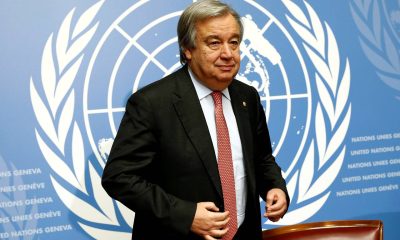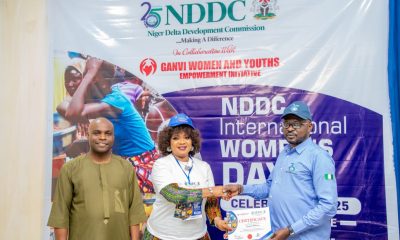FOREIGN NEWS
UN Women, NCCC Advocate For Gender Inclusion In Climate Policies

UN Women Nigeria, in partnership with the National Council on Climate Change (NCCC), has launched the Gender Integration Toolkit and Strategy for Nigeria’s Nationally Determined Contributions (NDCs), advocating for the inclusion of gender considerations in climate policies.
The toolkit is designed to integrate gender considerations into climate planning, financing, implementation, and monitoring across all levels of governance. It provides practical guidance to ensure that climate policies, projects, and investments are not only effective but also gender-responsive.
In her keynote address, Director-General of the NCCC, Mrs. Tenioye Majekodunmi, underscored the urgency of embedding gender considerations into climate policy.
“Gender equality is not just a social imperative—it is a climate imperative,” she declared.
She added, “When women have equal access to resources, farm yields rise, household resilience improves, and communities become more sustainable.”
The launch coincides with Nigeria’s efforts to implement its updated NDC 3.0, guided by the Climate Change Act of 2021 and the Long-Term Low Emission Development Strategy (LT-LEDS).
Majekodunmi noted that the new toolkit aligns with these frameworks and helps institutionalise gender-responsive approaches across key sectors, including energy, agriculture, transport, industry, and waste.
“We are building an institutional architecture that integrates gender considerations across all sectors,” she said. “The NDC Gender Integration Toolkit we launched today is a cornerstone of that effort.”
Developed by UN Women Nigeria, the toolkit is designed to equip national, state, and local institutions with the tools to identify gender gaps, integrate gender-sensitive approaches in project design, and monitor results through MRE-ready (Monitoring, Reporting, and Evaluation) and sex-disaggregated indicators.
“If you’re not tracking, you’re just wasting time,” Majekodunmi noted. “That’s what I love most about this toolkit—the ability to track results and make adjustments based on evidence.”
She stressed that gender equality must become a standard of performance, not an afterthought.
“No policy, no investment, and no decision on climate change should be made without considering its gender implications,” she emphasised. “This is about institutionalising gender-responsive budgeting and ensuring that women are part of the decision-making process—from the local to the national level.”
The DG praised the collaborative effort behind the toolkit’s development, acknowledging the support of key government ministries and agencies.
“I commend the UN Women Nigeria Country Office, the Federal Ministry of Agriculture and Food Security, the Federal Ministry of Environment, and the Federal Ministry of Women Affairs,” she said. “This type of resource is only possible through strong technical partnerships and shared commitment.”
Majekodunmi called on all stakeholders to treat the toolkit not as a final product but as a dynamic, evolving tool for lasting change.
“Let us use this toolkit not as an end in itself but as a living guide, a framework for shared accountability, a catalyst for innovation, and a bridge between national ambition and local impact.”
She concluded her remarks with a powerful message that captured the spirit of the event: “When gender equality drives climate action, sustainability flows naturally.”
Speaking at the launch, Beatrice Eyong, UN Women Country Representative to ECOWAS, emphasised the urgent need to centre gender equality in climate policy.
She highlighted the unequal impact of climate change on women, their central role in climate-sensitive sectors, and the importance of turning tools into tangible action.
Eyong revealed the gendered impacts of climate change, noting that women bear the brunt of its consequences, particularly in vulnerable regions.
“According to the UN, 80% of people displaced by climate change are women and children,” she stated. “Climate-related disruptions directly undermine food security, household incomes, and national economies. Nigeria is no exception.”
Second, she emphasised the vital but often overlooked contributions of women to climate adaptation, particularly in agriculture, food systems, and local environmental knowledge.
“Women have unique knowledge of the environment—about medicinal plants, animals, and sustainable practices,” Eyong explained. “They have something to bring to the table to make sure that whatever we are doing is inclusive, rich, and equitable.”
Eyong called on ministries, departments, and agencies to take ownership of the newly launched toolkit, translating it into real-world policy and programmatic change.
“Tools alone are not enough; they depend on strong ownership and active application,” she urged. “Mainstreaming gender in the energy sector, for example, is not only about including women in renewable projects but ensuring equitable access to training, finance, and technology.”
Ms. Ogochukwu Ukemezia, National Consultant on Gender Mainstreaming for NDC 3.0 and LT-LED, made a compelling case for translating the toolkit into real, system-wide change.
She emphasised the importance of action, the societal value of gender equality, and the power of inclusive development planning.
Ukemezia stressed that the event was not merely symbolic but a practical rallying point for all actors—from government ministries to development partners—to apply the toolkit in their daily work.
“Today’s event is more than a launch; it is a call for action, a call for every government institution, every development partner, and every stakeholder to embrace these tools and apply them meaningfully in their work.”
She reframed gender equality as a driver of national progress, innovation, and sustainable development, not just a moral concern.
“Gender equality is not just a moral advantage; it is a societal advantage. When we empower women and girls, we unlock innovation, resilience, and sustainable development for all.”
Drawing on Nigeria’s development planning history, she urged planners to move beyond token gender chapters and fully integrate gender data and needs across all sectors.
“Previously, what we did in the National Development Plan was to have a chapter for gender, and we said, ‘leave power out of it, leave work out of it.’ Now, we are putting gender in power, gender in agriculture, gender in energy, and gender in employment,” she stated.
Grace Obi Ukpabi, Social Development Director at the Federal Ministry of Budget and Economic Planning, emphasised the urgent need to move beyond generic national planning and instead use gender-sensitive data to design policies that respond to the diverse realities of Nigerians.
She also highlighted the shift from sidelining gender to making it central to development planning.
Ukpabi called for an intentional, data-driven approach to planning that recognises how different groups, especially women and children, experience policy differently. She urged planners to break the habit of treating the population as one homogenous block.
“When we are done, we must begin to disaggregate by gender, by vulnerability, by origin, and then intentionally prioritise what each section needs to truly resolve issues.”
She reflected on how past national plans relegated gender to a side chapter but praised the current shift to fully integrate gender concerns into power, infrastructure, energy, and other key sectors.
“Previously, we said, ‘leave gender out of this, leave power out of this.’ But now we are putting gender in power, gender in work, gender in employment. It’s making it more real.”
-
CRIME4 years ago
PSC Dismisses DCP Abba Kyari, To Be Prosecuted Over Alleged $1.1m Fraud
-
FEATURED4 years ago
2022 Will Brighten Possibility Of Osinbajo Presidency, Says TPP
-
FEATURED2 years ago
Buhari’s Ministers, CEOs Should Be Held Accountable Along With Emefiele, Says Timi Frank
-
BUSINESS & ECONOMY2 years ago
Oyedemi Reigns As 2023’s Real Estate Humanitarian Of The Year
-
SPORTS2 years ago
BREAKING: Jürgen Klopp Quits Liverpool As Manager At End Of Season
-
SPORTS2 years ago
Could Liverpool Afford Kylian Mbappe For €200 million? Wages, Transfer Fee
-
ENTERTAINMENT2 years ago
Veteran Nigerian Musician, Basil Akalonu Dies At 72
-
FEATURED2 years ago
Tribunal Judgement: Peter Obi Warns Of Vanishing Electoral Jurisprudence, Heads To Supreme Court
-
BUSINESS & ECONOMY2 years ago
Oyedemi Bags ‘Next Bulls Award’ As BusinessDay Celebrates Top 25 CEOs/ Business Leaders
-
FEATURED3 years ago
2023 Presidency: South East PDP Aspirants Unite, Demand Party Ticket For Zone



































